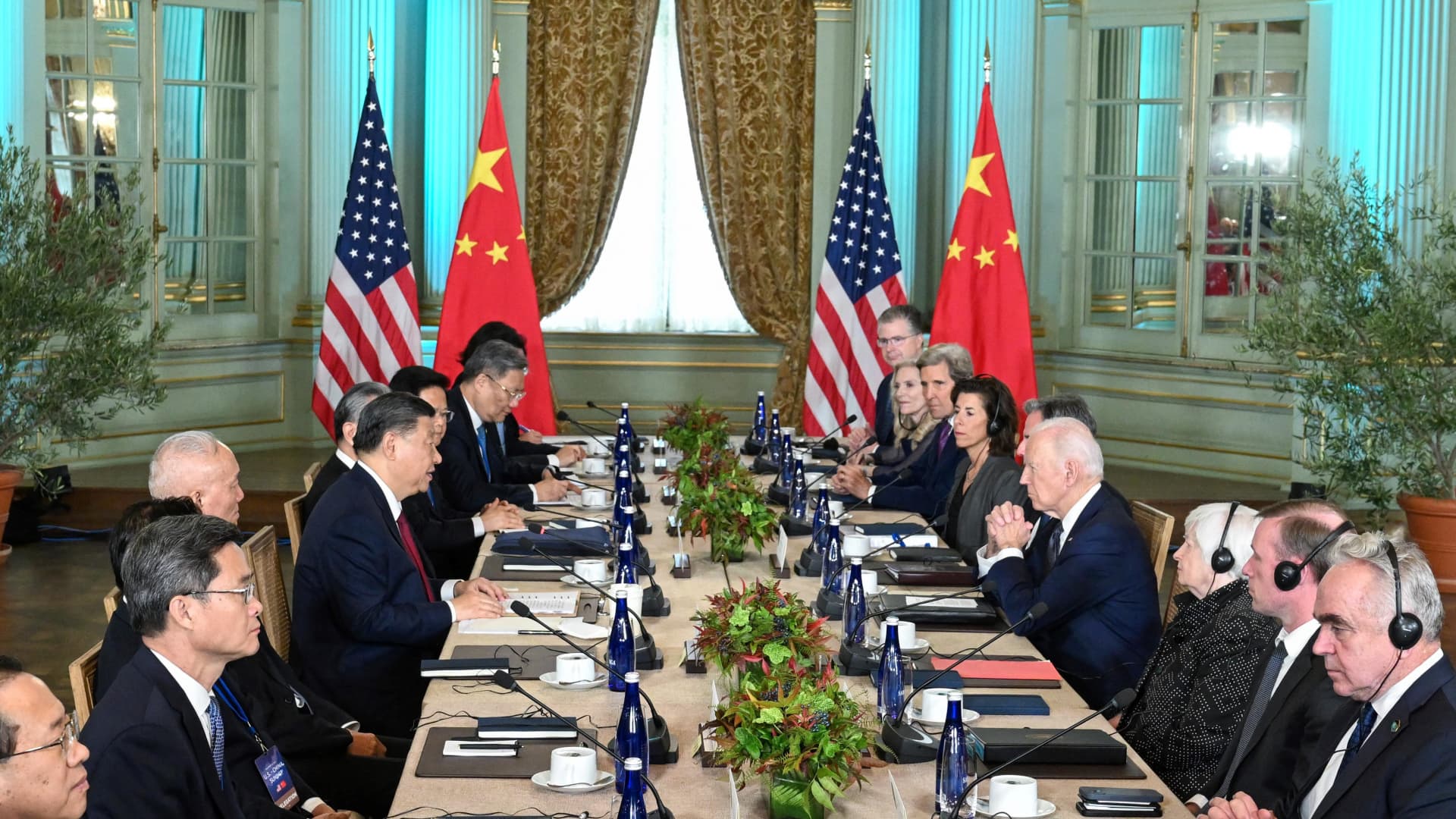U.S. President Joe Biden delivers remarks during a visit to the United Association Local 190 Training Center in Ann Arbor, Michigan, U.S., September 6, 2024.
Craig Hudson | Reuters
The Biden administration announced new steps on Friday to curtail what it calls the “overuse and abuse” of a longstanding trade law that permits low-value shipments to enter the United States without paying import duties and processing fees.
The steps include a new rule proposal, which would bar overseas shipments of products that are subject to U.S.-China tariffs from being eligible for the special customs exemption.
Known as the de minimis loophole, the trade provision allows packages with a value of less than $800 to enter the United States with relatively little scrutiny. Over the past decade, the number of de minimis shipments has exploded, from roughly 140 million to more than a billion, according to a White House estimate.
“The drastic increase in de minimis shipments has made it increasingly difficult to target and block illegal or unsafe shipments coming into the U.S.,” Daleep Singh, deputy national security advisor for international economics, told reporters on a Thursday call to preview the actions.
Officials say the explosion in de minimis shipments is largely driven by a few Chinese-linked online retail giants like Shein and Temu, which use the exemption to ship millions of dollars worth of clothing and inexpensive household goods from factories in China directly to American customers.
Each individual package is typically worth far less than $800, and thereby qualifies for the de minimis exemption.
But new eligibility restrictions for products that are subject to tariffs under Section 301, Section 201 and Section 232 — like the ones proposed Friday — could upend this business model.
“Since approximately 70% of Chinese textile and apparel imports are subject to section 301 tariffs, this step will drastically reduce the number of shipments entering through the de minimis exemption,” said Singh.
In addition to the proposed tariff rules, the White House also announced plans for a new rule to “require specific, additional data for de minimis shipments – including the 10-digit tariff classification number and the person claiming the de minimis exemption,” according to a fact sheet.
The Biden administration also called on Congress to pass legislation to overhaul the original de minimis rules.
Exhibitors during the opening of Shein’s ephemeral store, at ABC Serrano, on 26 April, 2024 in Madrid, Spain.
Alejandro Martinez Velez | Europa Press | Getty Images
An obscure tariff law loophole passed by Congress in 1930 – the de minimis exemption landed in the White House’s crosshairs again in recent years after lawmakers raised concerns that the rule allows foreign retailers to evade tariffs and scrutiny of their packages at the border.
Last year, the House Select Committee on the Chinese Communist Party released a report on Shein and Temu and determined the two companies are “likely responsible for more than 30 percent of all packages shipped to the United States daily under the de minimis provision, and likely nearly half of all de minimis shipments to the U.S. from China.”
Traditional retailers typically import containers of merchandise and send them to U.S.-based warehouses for distribution. But Shein and Temu usually ship their products directly to American consumers through their networks of Chinese suppliers.
By utilizing the de minimis loophole to avoid tariffs, Chinese retail giants have likely skirted tens of millions of dollars in import duties.
In 2022 alone, Gap paid $700 million in import duties, H&M paid $205 million and David’s Bridal paid $19.5 million, according to the House Select Committee on the Chinese Communist Party.
Shein and Temu, however, paid no import duties at all, the committee has said.
A Shein spokesperon on Friday disputed the committee’s assertion and said that it paid “millions of dollars in import duties in both 2022 and 2023.”
Lawmakers contend that by avoiding the hefty import duties the United States imposes on most Chinese textiles, apparel and footwear, Shein and Temu are able to offer extremely low prices, and outcompete their import-paying competitors.
They have also argued that the exemption allows Shein and Temu to import products made with slave labor without detection because the packages aren’t subject to the same level of scrutiny and testing.
Shein has contended that its inventory-lite supply chain and overall business model allow it to offer such low prices and its pricing structure isn’t related to the de minimis exemption.
“SHEIN makes import compliance a top priority, including the reporting requirements under U.S. law with respect to de minimis entries,” a company spokesperson told CNBC on Friday.
Last summer, Shein’s executive chairman, Donald Tang, called for reforms to de minimis and said the rule “needs a complete makeover to create a level playing field for all retailers.” He did not outline what those reforms would look like.
On Friday, the Shein spokesperson said the company stands by Tang’s comments.
“We look forward to working with all stakeholders on reform,” the spokesperson said.
The company has acknowledged that cotton from banned regions has been found in its supply chain and said it’s working to fix the issue.
When reached for comment, a Temu spokesperson said the company’s growth “does not depend on the de minimis policy. We are reviewing the new rule proposals and remain committed to delivering value to consumers.”
In a statement, Temu said it is “dedicated to upholding ethical labor practices” and “forbids the use of any form of forced, child, or penal labor and requires adherence to all local labor laws.”









